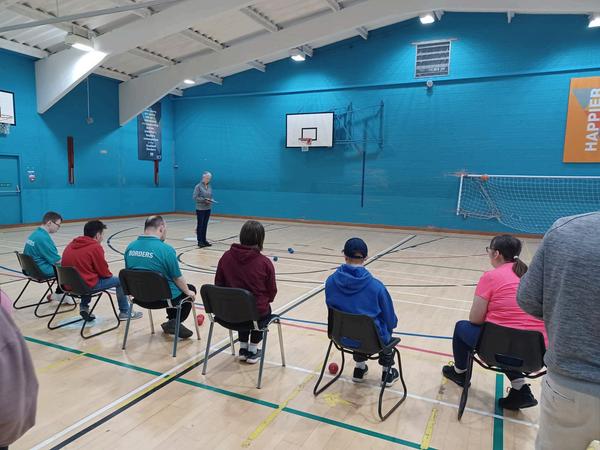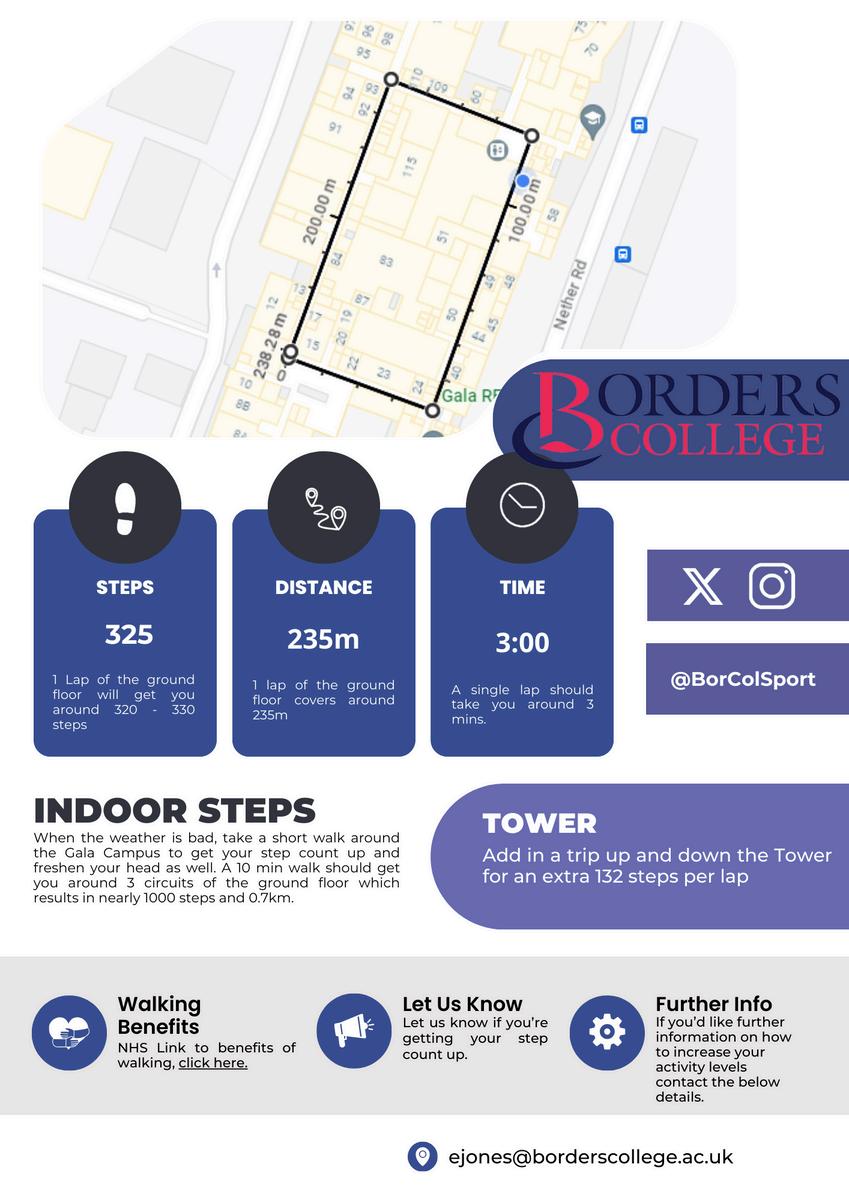










Thegroupofmountainbikestudents whoareallontheBASELevel6MTB coursewerethefirstgrouptoget outonplacement.Theyhadaled ridewithlocalguideLiamLong
Theirfirstridewasa33kmride throughsomedifferentterrainasto whatthegroupareusedto.Thiswas alsoachanceforLiamtoseewhat levelthegroupwereat.Liamquickly assessedthatthegroupwerevery capableandthathecouldtakethem onmorechallengingridesoverthe next2weeks.
Thisincludedgoingoutonridesin thehillsbetweenAdejeandAronaas wellasinthePalm-Marareatothe SouthEastoftheIsland.
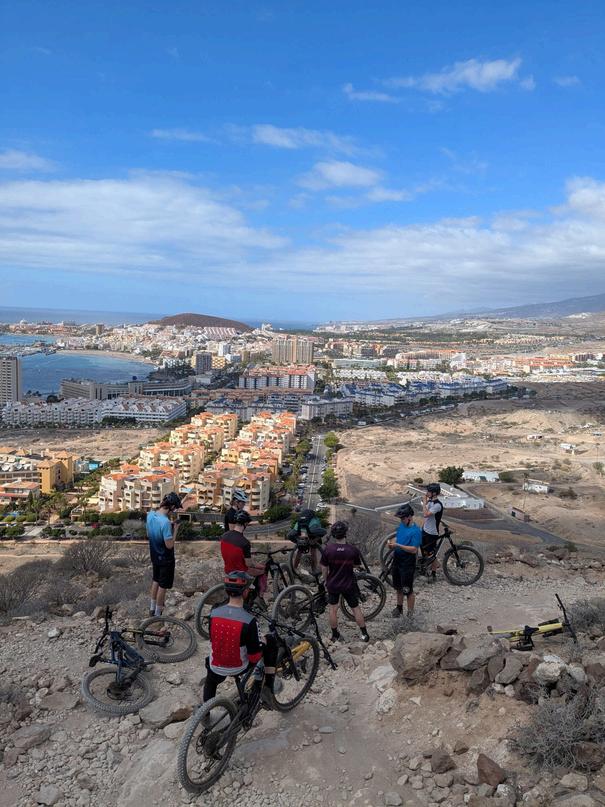
Intotalthebikerswereouton5differentridesoverthecourseofthetripwhichtheyfound notjusttechnicallychallengingbutalsomentally Workingin23degreeheatonlooseterrain isquitedifferenttowhattheywouldhavebeenexperiencingintheUKatthistime. The studentsalsohadtomakesuretheywerehydratingandfuelingthemselvesproperlyforthe workthattheyweregoingtobedoing,sotherewasabigemphasisonperformance behaviourstoensurethattheyperformedattheoptimumlevel
Aswellastheirridesthebikersalsoattendedaminimumof2gymsessionsperweekatthe CDMariniogym.Somealsochosetodomoregymsessionsinthehotelgymtotopuptheir scheduledsessions. Everyonealsoattended2sessionsattheBoxeoPovedanaboxinggym wheretheywereputthroughaboxingcircuitinsession1,followedbyapad/bagsessionthe followingweek.Thistookallstudentsouttheircomfortzoneandlearnedhowdifferent sportsrequiredifferenttypesoffitness.
Speakingofthetrip,CorranFerrysaid“Goingonthistripnotonlyhelpedwithourmountain biking,beingabletohandledifferentterrain,italsohelpeduslearnkeylifeskillsliketime keepingandleadership.” 02/11


Our rugby students enjoyed a winter training environment during the trip where they focused on some skills development sessions as well as training with the local rugby side- Nandu Rugby Club, twice a week During their on pitch sessions in the mornings the students developed their footwork and evasion skills as part of their coursework. As well as this they also developed their hand catch and pass and offloading skills.
When training with Nandu, the students quickly recongised that rugby was far from being a popular sport on the island with the Senior team unable to get access to a pitch until 2100 at night due to the popularity of football Even with the later start time, the temperature was still warm and dry. Throughout the sessions the players integrated well with locals and players from other countries including France and Italy. The mix of languages challenged the students communication skills with some players unable to speak English
The students also took part in a minimum of 2 Strength and Conditioning sessions per week during the trip and 1 boxing session each week. On top of this, they had to take part in the climb up Mount Teide, visited T3 Performance Centre and also sat an assessment as part of their coursework online.
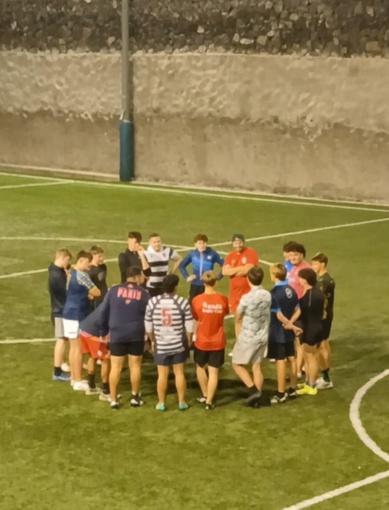



We are excited to announce the launch of the Wellbeing Hour, a new initiative designed to support staff wellbeing by promoting physical activity and improving overall morale. Following a successful pilot project in the summer of 2024 and based on valuable feedback from the recent Staff Engagement survey, this initiative will be introduced from the week beginning March 3, 2025.
The Wellbeing Hour is an optional, weekly activity that allows you to take one hour each week to focus on your physical and mental health while at work. This dedicated hour is designed to give you the space to engage in activities that will enhance your wellness without affecting your work schedule. Simply inform your line manager, and you’re good to go!

Markus, a dedicated student in the HNC Sports Coaching and Development Level 7 program, is proving his commitment to developing as a coach. Having previously completed his Level 6 qualification in 2024, he continues to push himself toward excellence in his field. His recent International Experience in Tenerife exemplified this dedication, where he had a planned one-day placement with the prestigious Academia de Tecnificación Nomads. What was initially meant to be a brief placement quickly turned into an exceptional opportunity due to Markus's outstanding performance and coaching ability. Impressed by his skills, the coaching team invited Markus to return every day for the full duration of the training camp. This unanticipated chance allowed Markus to immerse himself fully in football coaching, working with young athletes from around the world for eight consecutive days. This experience was an invaluable exposure to a range of cultures and coaching styles. Markus worked with athletes from various backgrounds, challenging him to adapt and tailor his coaching methods to meet the needs of players who had limited proficiency in English.
The goal of the Wellbeing Hour is to provide staff with a regular opportunity to increase physical activity and raise their overall wellbeing. Whether you participate in organised activities or decide to spend the hour doing something on your own, the Wellbeing Hour is about prioritising self-care during your workday.
To overcome the language barrier, Markus displayed impressive adaptability by learning key coaching terminology in both Spanish and Italian. His willingness to pick up new languages showed his eagerness to improve as a coach. Additionally, Markus made effective use of visual demonstrations, ensuring his instructions were clear and accessible to everyone, regardless of their language skills. This hands-on approach not only helped bridge the communication gap but also enhanced his overall coaching techniques.
Each week, starting from March 3, 2025, staff will be encouraged to take part in the Wellbeing Hour. You do not need to make up the time spent during this hour, as it’s considered part of your regular work schedule.
Markus’s proactive nature further shone through during his time in Tenerife. He took the initiative to arrange additional placements with Edgar from Academia de Tecnificación Nomads, demonstrating his strong organisational abilities and a mature, self-driven attitude. His efforts to work with a completely new team of coaches also contributed to his personal growth, as he effectively integrated into unfamiliar settings and forged valuable relationships with his peers.
The Active Campus Coordinator will provide organised activities, such as local walks, jogs, interactive yoga sessions, and even Boccia, with sign-up links made available in advance. If you’d prefer to engage in your own physical activity, feel free to do so—whether that’s a walk, stretching, or another form of exercise. If you're interested in starting a new activity group, the Active Campus Coordinator will be happy to support this.
Through his hard work and dedication, Markus gained significant experience that has enriched his coaching knowledge and practical skills. His time in Tenerife was a resounding success, pushing him outside of his comfort zone and providing him with a wealth of new experiences that will undoubtedly shape his future coaching career.
Please note that the Wellbeing Hour is not intended for personal errands (like shopping or leaving work early to go home) and should take place either on campus or at home if you are working remotely.
Staff members who sign up for or attend an organised session will not need to report on their individual activity; attendance will be automatically recorded. However, to help track engagement and assess the impact of the Wellbeing Hour, we will ask all participants to complete a brief survey once a month. This is part of our commitment to report on the effectiveness of the programme to our partners.
The success of the Wellbeing Hour will be reviewed annually and reported to the Senior Leadership Team (SLT) through the Wellbeing Group. We’re optimistic that this initiative will not only boost staff physical activity but also enhance overall wellbeing and morale. We encourage all staff to take full advantage of this fantastic opportunity to improve your health and wellbeing
Seventeen-year-old Hawick Youth Rugby player Teri Filip Kubicki has described his recent sports coaching trip to Tenerife with fellow Borders College students as an “extraordinary experience.”
Between February 15 and March 2, Filip and 20 of his classmates traveled to the largest of Spain’s Canary Islands to enhance their coaching abilities while also developing essential life skills.
“My main focus during the trip was coaching rugby at the local club, Nandu Rugby,” Filip shared. “I worked with players across all age groups, from under-10s to under-18s, and even coached the senior team.”
Having previously represented Poland in international under-18 rugby sevens, Filip relished the challenge of stepping into a coaching role.
“This experience was truly incredible, and I felt so fortunate to be part of it,” he said. “One of the biggest lessons I learned was that you can accomplish anything if you put your mind to it. I had to step outside my comfort zone and push past many barriers.”
Throughout the trip, Filip saw significant personal growth, improving his social skills, learning to improvise in coaching sessions, and leading large groups. His ability to demonstrate techniques effectively also helped him bridge the language barrier.
A particularly proud moment for Filip was coaching players his own age—and even older.
“Before the trip, I never imagined I’d be coaching people my age or those more experienced than me, but I really enjoyed it,” he said.
The highlight of the experience came when his coaching directly influenced a match outcome.
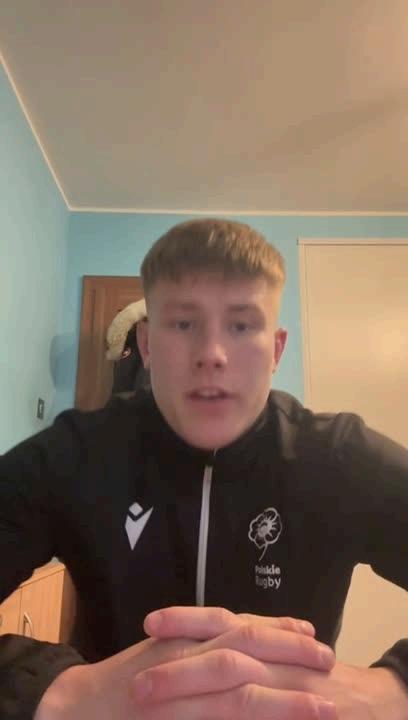

“The best part was hearing from the players that the set play I taught the backs in training led to a fantastic try during their match against Gran Canaria,” he recalled.
Filip views this trip as a key milestone in his coaching journey and is eager to take on similar opportunities in the future. “This was an incredible step forward, and I hope to participate in more experiences like this whenever they arise.” 05/11



The Active Campus (AC) initiative has made significant strides in increasing sports participation and engagement across colleges. The role of the Active Campus Coordinator (ACC) has been instrumental in driving this success, fostering a culture of physical activity and inclusivity.
The first year of the AC programme saw remarkable growth in sports participation and activity sessions:
31% increase in the number of sessions from baseline to full-year participation. 79% rise in total participants, showcasing the growing demand for physical activity.
53 different sports and physical activities were offered across 16 colleges, representing a 152% increase from the 21 sports available before the AC programme. While these numbers illustrate the expanding reach of the initiative, they do not fully capture the extensive work ACCs have undertaken within their respective college environments
Football emerged as the most popular sport, making up 20% of total visit figures in Year 1 Badminton followed, accounting for 9% of annual participation. The wide variety of sports offered indicates a broad engagement across different activities.
Despite its success, the programme has encountered challenges, including: Facilities & Equipment – Ensuring access to appropriate sports infrastructure Equity of Programme Delivery – Maintaining consistency across different campuses. Capacity & Funding – Addressing transport, sustainability, competitions, and equipment needs
The impact of ACCs extends beyond numbers, as reflected in participant feedback:
“ACCs have made me want to stay at college. They are great!”
“The programme is open to all abilities and makes me feel part of a group, even if I’m not as fit as others ”
“As a lecturer, ACCs have enabled me to support students in extracurricular activities, which has strengthened classroom engagement.”
The ACC programme has already demonstrated its value in supporting student well-being, physical activity, and community engagement. As it evolves, continued investment in resources and strategic planning will be crucial for sustaining its positive momentum






At Borders College we want students to leave in the best position possible to take the next step in their journey, whether that is continuing in education or going into employment. In the world of sport a lot of experience is gained through taking up voluntary opportunities to build CV’s and apply new skills in a supported environment. This month we are highlighting a lot of the opportunities that are available. Whilst these are all sports based placements/vacancies, some may interest students from a Business background or Film & Media.
Sportscotland will focus on ‘Try Something New’ in the Month of February and it would be great to hear of any Borders College Students that are trying their hand at something new in the sporting landscape regardless of back ground

Equality Steering Group Ethnicity Lead
Scottish Student Basketball
Scottish Student Chair Golf
Scottish Student Rugby Development Group Member
For more details on any of the above click here




Various opportunities are available with Live Borders, follow this link to see who to contact.
Various volunteering and small project placements are available within the College. We are also happy to support any of your own ideas. To discuss further, email your Active Campus Coordinator by clicking here.
The Borders College Boccia team made an impressive first-ever appearance in the Borders Boccia League, narrowly missing out on victory in a thrilling opening-round match against Gala.
Competing for the first time, the College team put on a determined performance, keeping the game evenly matched throughout. Going into the final round tied at 5-5, they held a two-point lead, only for Gala to stage a late comeback and snatch a dramatic 6-5 win.
Five students from various courses represented the College, showcasing skill, teamwork, and resilience in their debut outing. Over the course of the League, the team will compete against all the other Borders towns, gaining valuable experience and building on their strong start.
Active Campus Coordinator commented on the team's progress: “Boccia has been growing at the College since the ACC role began Some of the students have already taken part in events at Stirling University and here at the Queens Centre last year. However, for some, this was their first tournament. It's great to see a College team competing in a local competition, which is run by Greig Shortreed, the area’s Disability Sports Development Officer. We're also hoping that this will provide a pathway into local Boccia Clubs for students who graduate this year and want to continue playing beyond College.”
The team will return to action on April 24th at the Queens Centre, where they will look to secure their first victory in the competition.
